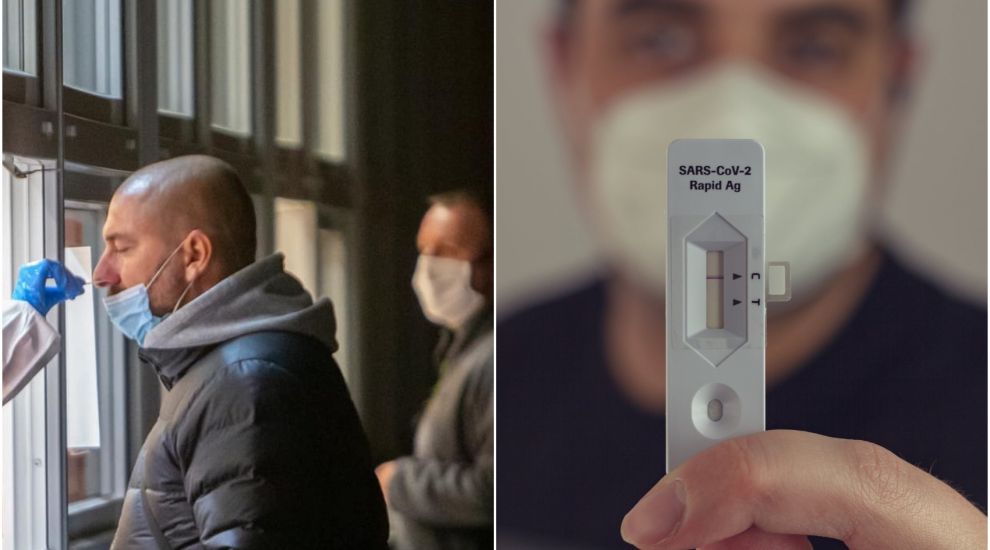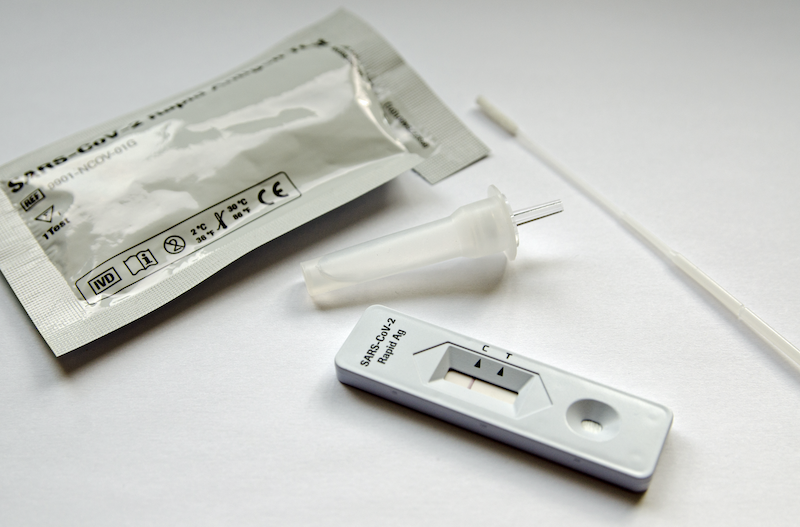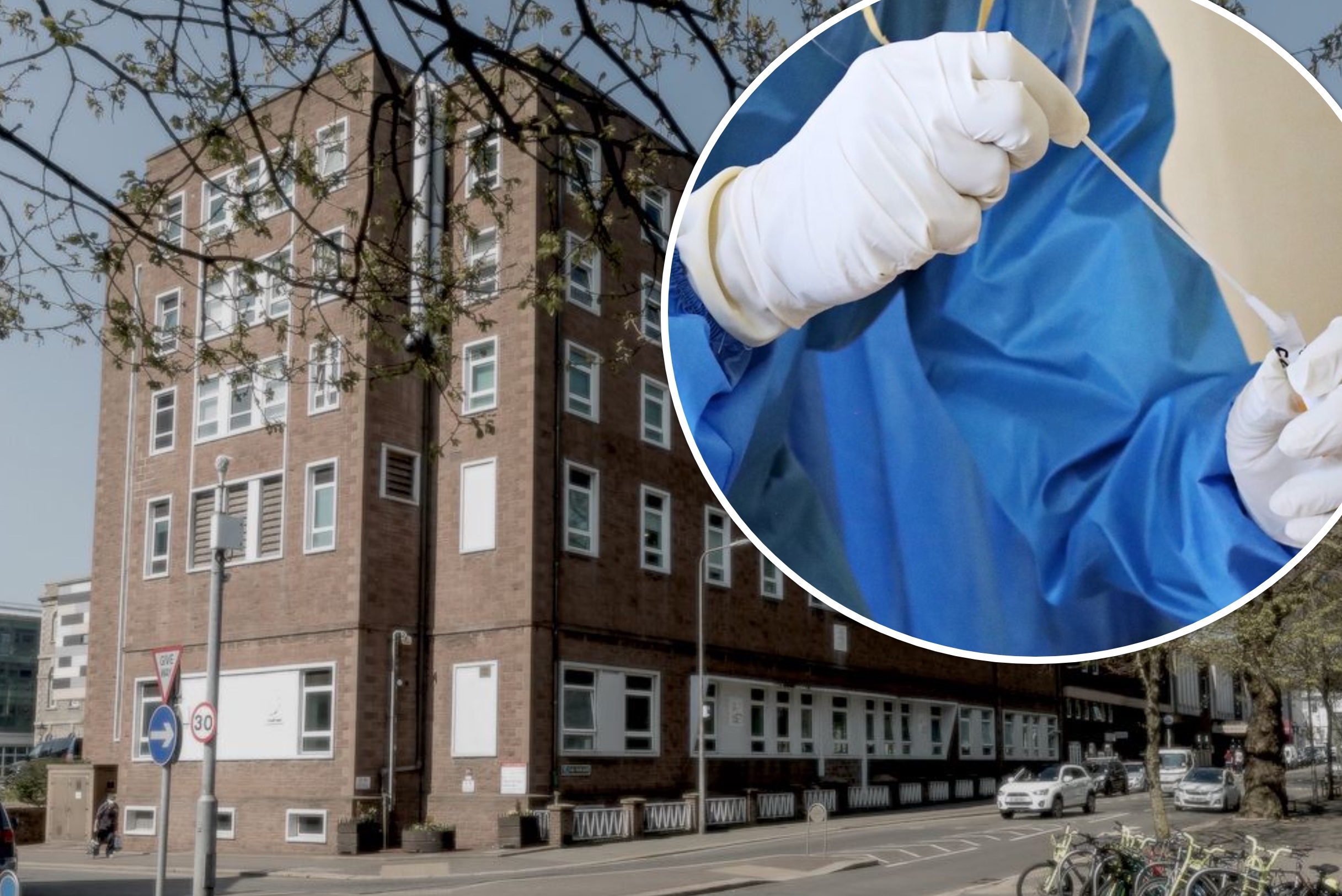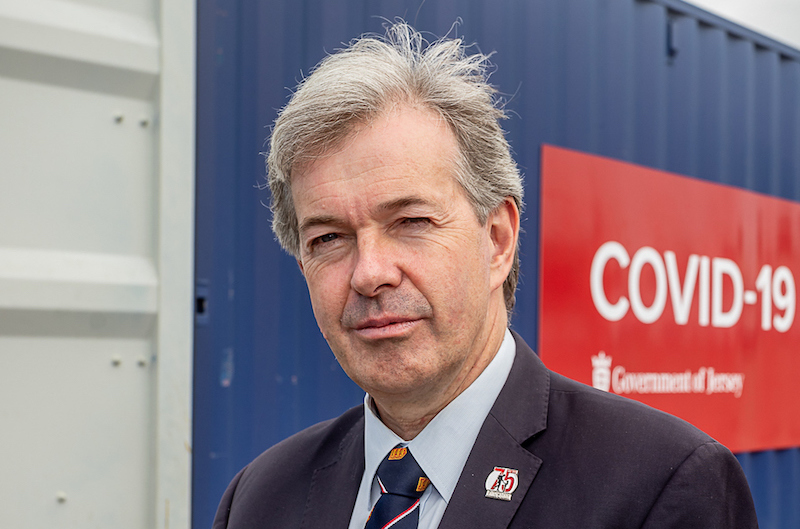


With Jersey's border controls being loosened this week, the government has set out its plan to suppress covid-19 in the island, with lots more testing a key part of keeping virus levels as low as they can.
The new testing regime will work alongside the current vaccination programme - which officials say now protects 43% of islanders - border controls, the track and trace system and measures to reduce transmission of the virus such as hand-washing, cleaning touch-points and wearing masks.

Pictured: Businesses across a number of sectors will be offered weekly lateral flow device tests from next month.
Businesses in a number of sectors will be asked to give all of their staff weekly lateral flow tests, with 13 trialling the new system from next week, and the official launch set for the 17 May.
Once businesses have signed up online, the government plans to post sufficient lateral flow testing devices to them, alongside instructions explaining how to use them, asking them to test all employees every week, and submit the results.
If an employee tests positive, they will then be required to isolate pending the results of a full PCR test.
An app is also being developed to go alongside the tests.
Pictured: Retail and hospitality will be among the businesses who will be offered weekly testing as part of the new scheme.
To encourage businesses to sign up, the Government have said they are working on a system that would allocate a ‘certified’ status, to reassure customers that a particular business is taking part in the new testing regime.
Sectors that will be offered the lateral flow kits are:
Schools
Weekly testing for teachers and students in Years 11 to 13 will continue using Lateral Flow Devices. Students and staff will still be offered a PCR test every six weeks.
This part of the plan involves protecting vulnerable and enclosed populations, as well as those servicing them, through asymptomatic testing for anyone entering, living and working in enclosed communities, as well as those in health services.

Pictured: Hospital staff will be amongst those now tested at least every fortnight.
This will involve 'peer-to-peer' swabbing between trained employees, delivered primarily using DiaSorin antigen testing, which the Government says has a “similar” accuracy to PCR. This will be done at least once every fortnight.
For new admissions into those institutions, and care home visitors however, PCR tests will be maintained. Patient testing will also continue as normal.
PCR testing for all incoming travellers will continue, with the island continuing its ‘Traffic Light’ system.
Travellers from green zones will have to isolate till their Day 0 negative result, travellers from amber zones till their Day 5 negative result, and travellers from red zones until their Day 10 negative result.
The Government have said they are looking for an additional pool of working staff for testing at the island’s Ports, to prepare for when travel gets busy at the height of summer.

Pictured: The Chief Minister said the new testing would limit spread in the community.
Chief Minister, Senator John Le Fondré said: “We have made good progress with the Vaccination Programme, but this was never designed to be a stand-alone measure. The presence of variants of concern and their global reach, remains under close observation.
“As Jersey prepares to enter Stage 6 of the Reconnection Roadmap on 10 May, and the Vaccination Programme prepares to open to the next cohort of under 40s, we look forward to enjoying a summer of freedom compared to the restrictions we have followed.
“Due to these increased freedoms, it is vital that any potential spread in the community is limited and controlled. The way to achieve this, is through regular, widespread testing.”
Deputy Medical Officer of Health, Dr Ivan Muscat said: “Testing and diagnosis remain an extremely important measure to avoid uncontrolled spread of virus while we continue to learn and understand how to best respond, treat, and manage COVID-19 in both the short and the long term."

Pictured: Dr Ivan Muscat said that testing remains an important part of controlling the virus, alongside the roadmap and vaccination programme.
He continued: “At least 30% of COVID-19 cases are asymptomatic. And patients who go onto to be symptomatic can also transmit infection before they develop symptoms.
“Active case finding is a vital tool in the management of all infections and therefore features strongly in Jersey’s defence against COVID. Early detection of positive cases to avoid asymptomatic, community transmission which might otherwise go undetected and lead to outbreaks is essential. Just because one person might present as asymptomatic doesn’t mean that those they infect will not develop significant disease.
“Of course, we have the Vaccination Programme which is also hugely important in our fight against COVID. It offers those fully vaccinated an 80-90% chance in avoiding serious illness or death, but we are still learning about the positivity rates and transmission in fully vaccinated individuals.

Pictured: Health Minister Deputy Richard Renouf
“The latest evidence looks promising, but as in all other infections it is far better to adopt a multi-layered response, particularly when we are still learning about an infection, when immunity is still being gained and when emerging variants pose a continuing threat.”
Minister for Health and Social Services, Deputy Richard Renouf said: “We want to keep Islanders safe and maintain the freedoms we have started to enjoy. Diagnosis is a vital element in health care and COVID-19 is no different. Without diagnosis, it would be impossible to establish any potential impact of this virus on our health and wellbeing.
“Increasing the frequency and reach of testing will sit alongside the continuation of the COVID-19 Vaccination Programme and other public health measures, as the core preventative actions which support resuming normal activities."
Comments
Comments on this story express the views of the commentator only, not Bailiwick Publishing. We are unable to guarantee the accuracy of any of those comments.